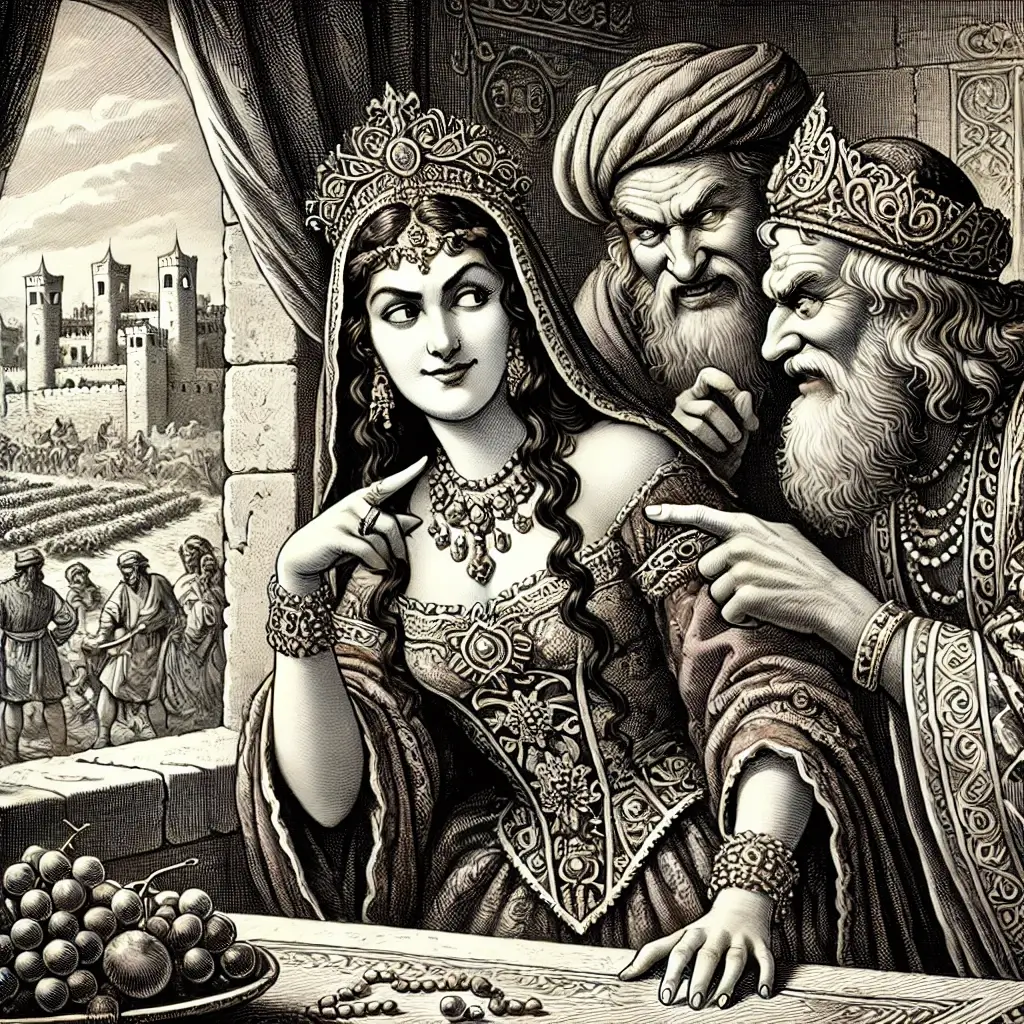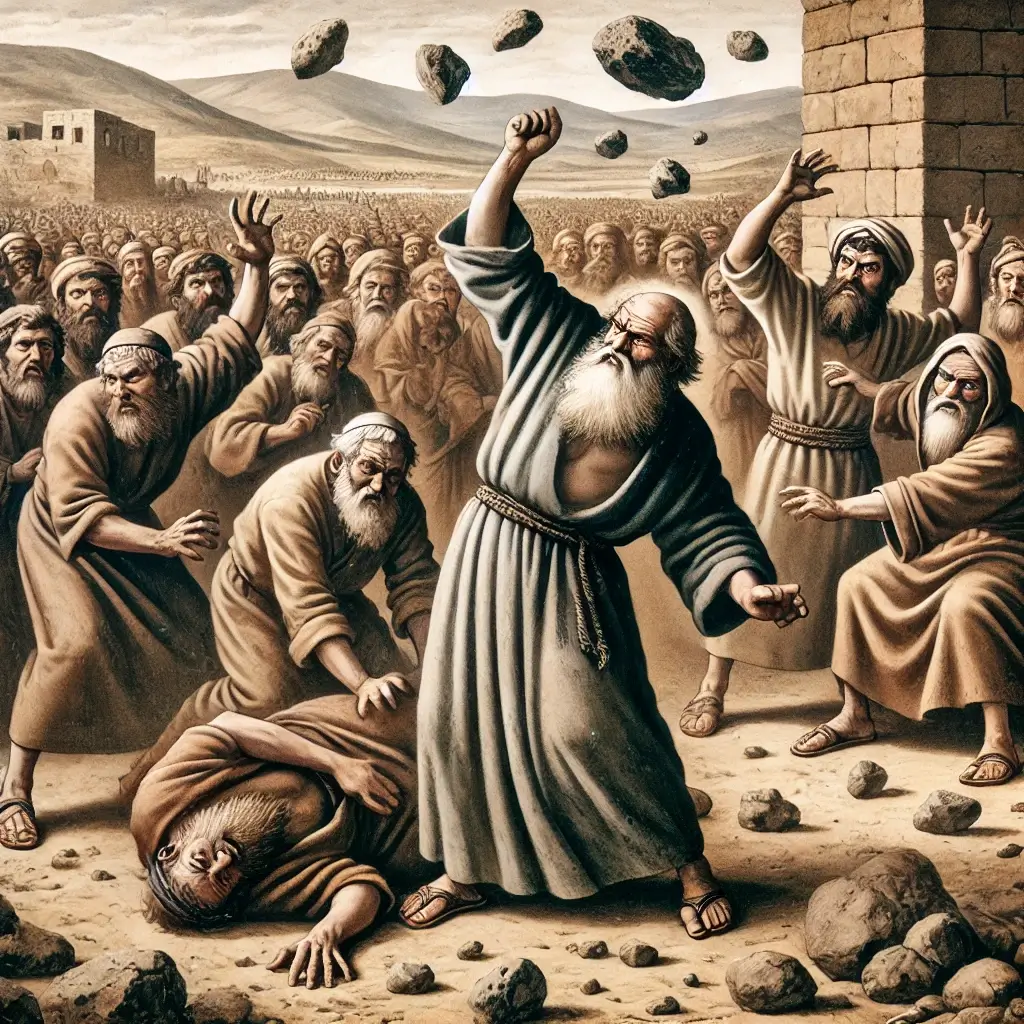SUMMARY OF naboth in the bible:
- Who Naboth was: Naboth was a man from Jezreel who owned a vineyard near King Ahab‘s palace. When Ahab tried to buy the vineyard, Naboth refused, valuing his family inheritance. Jezebel, Ahab’s wife, conspired against Naboth, causing him to be falsely accused of blasphemy and stoned to death. After Naboth’s death, Ahab took possession of the vineyard, but was confronted by the prophet Elijah, who prophesied doom on Ahab and his house because of this injustice.
- Who was Naboth descended from? He was descended from Israelites, specifically from the tribe of Issachar. He owned a vineyard in Jezreel, inherited from his ancestors, indicating that his family had ancient roots and property in the region.
- Naboth meaning: The name “Naboth” is of Hebrew origin and means “fruit” or “fruitful”. This meaning is particularly appropriate considering that Naboth owned a vineyard, a plantation that produces fruit.
- Genealogy of Naboth: The Bible doesn’t give specific details about Naboth’s genealogy. We do know that he was an Israelite from Jezreel who owned a vineyard that he had inherited from his ancestors.
who was naboth in the bible?

the story of naboth in the bible
Who Naboth was in the Bible stands out for his integrity and fidelity to his roots. His story is told in the Book of Kings in the Old Testament of the Bible, providing valuable insights into moral and ethical issues regarding property, greed and justice.
“Give me your vineyard for a garden, for it is next door to my house, and I will give you another vineyard for it that is better than it; or if it seems good to you, I will give you its value in money.”
1 Kings 21
The account of who Naboth was in the Bible not only illustrates the importance of family heritage and traditions, but also reveals the devastating consequences of the unbridled quest for power.
Born at a time marked by political disputes and social clashes, Naboth was known for his honesty and dedication to the land that had belonged to his family for generations.
His vineyard represented not only a source of sustenance, but also a symbol of his identity and pride. By refusing to sell his estate to King Ahab, the persona of Naboth in the Bible demonstrated courage in the face of external pressures and became a timeless example of resistance against oppression.
Revealing Naboth’s persona in the Bible
The story of Naboth in the Bible is a remarkable account that reveals much about this man’s personality and character. Originally from Jezreel, Naboth was a farmer who owned a vineyard near King Ahab’s palace.
Naboth’s story in the Bible is told in the first Book of Kings, chapter 21, as part of the narrative of the consequences of greed and injustice. Naboth is described as someone who was faithful to his family’s traditions and strongly attached to his inheritance.
His refusal to sell or exchange his vineyard, even in the face of King Ahab’s tempting offers, demonstrates his commitment to the traditions and values he held sacred. Naboth’s unwavering stance in protecting his land reflects not only his material attachment, but also his respect for his family heritage and his ethical principles.
The importance of Naboth in the Bible
Within the biblical context, the story of who Naboth was plays a significant role in highlighting fundamental issues relating to divine justice, property rights and the moral consequences of human actions.
By refusing to give in to King Ahab’s pressure to sell his vineyard, who Naboth was becomes a symbol of resistance against oppression and the defence of personal integrity in the face of worldly temptations. The Naboth narrative also serves as a powerful reminder of the inevitable repercussions of injustice and greed.
Queen Jezebel’s evil intervention to secure possession of the vineyard resulted not only in the false accusation against who Naboth was in the Bible, but also in harsh divine punishments on Ahab and his house.
This story of Naboth in the Bible serves as a timeless warning about the dangers of unbridled desire for power and material wealth at the expense of higher spiritual values.
who was naboth a descendant of?
Who was Naboth in the Bible? He was a man who belonged to the lineage of Israel, descended from the tribes that received their inheritance in the land promised by God. His family played a significant role in the community, being respected and recognised for their faithfulness to the traditions and laws of the people of Israel.
Who Naboth was in the Bible was known not only for his honourable lineage, but also for his integrity and commitment to the teachings of the Jewish faith. His ancestry went back to the times of the forefathers who had conquered the promised land with sacrifice and devotion.
genealogy of naboth

The Bible doesn’t give specific details about Naboth’s genealogy. We do know that he was an Israelite from Jezreel who owned a vineyard that he had inherited from his ancestors. His refusal to sell the vineyard to King Ahab, mentioning his parents’ inheritance, suggests that the property had been in the family for several generations.
This reference indicates the importance of land and family inheritance in Israelite culture, but further details about his ancestors or descendants are not recorded in Scripture.
Naboth’s Personality and Character
Naboth in the Bible was a man of integrity, fairness and firm convictions. His personality was marked by moral uprightness, honesty and respect for the traditional values of his community. He was known for his diligence in looking after his land, showing zeal in preserving the family heritage received from his ancestors.
In addition, Naboth in the Bible was revered for his loyalty to the Jewish faith, practising religious rituals with fervour and remaining faithful to the commandments of the divine law. His strength of character and commitment to justice made him a respected figure among his fellow citizens.
Naboth meaning
The meaning of the name Naboth is of Hebrew origin and means “fruit” or “fruitful”. This meaning is especially relevant because Naboth in the Bible owned a vineyard in Jezreel, which he valued as an inheritance from his ancestors.
The story of Naboth told in the Bible emphasises his faithfulness to the traditions and law of Israel, as well as the injustice he suffered at the hands of King Ahab and Queen Jezebel. The meaning of his name highlights the irony of his tragic story, where a man whose name symbolises prosperity and fruitfulness fell victim to an evil plot.
Ahab’s desire for Naboth’s vineyard

The story of who Naboth was in the Bible is marked by King Ahab’s intense desire for the vineyard that belonged to him. The vineyard was considered a valuable and symbolic property, representing the heritage and identity of who Naboth was in the Bible.
However, King Ahab, dominated by greed and covetousness, saw that land as an opportunity to expand his domains and increase his wealth. He lusted after the vineyard as if it were his right, completely ignoring the family ties and moral values surrounding the property.
Naboth’s refusal to sell his family inheritance
Whoever Naboth was in the Bible, with nobility and respect for his roots, he vehemently refused to sell his family inheritance to King Ahab. His decision was not based solely on the material possession of the land, but on the principle of preserving Naboth’s history in the Bible and his family’s tradition.
He understood the intrinsic value of the vineyard not just in monetary terms, but as a precious legacy that should remain intact. His refusal to give in to the King’s pressure demonstrated his integrity and steadfastness in the face of the powerful man’s temptations.
FIVE FACTS ABOUT WHO NABOTH WAS IN THE BIBLE:
- Who Naboth was in the Bible Naboth was a farmer known for his integrity and faithfulness to family traditions.
- He refused to sell his vineyard to King Ahab, demonstrating his firmness in preserving his inheritance.
- Jezebel’s Machiavellian intervention resulted in a false accusation against who Naboth was in the Bible.
- Who was Naboth in the Bible was the victim of an unfair trial and ended up being condemned to death.
- The story of who Naboth was in the Bible serves as a warning against greed and corruption, emphasising the importance of divine justice.
Jezebel’s Machiavellian intervention to secure possession of the vineyard

Jezebel’s Machiavellian intervention was a crucial point in this tragic story of Naboth in the Bible. Realising that her usual wiles would not be enough to get what she wanted, Jezebel hatched a cunning plan to secure possession of the vineyard for herself and her husband.
She used political and legal manipulation to defame the image of who Naboth was in the Bible before the people, fabricating false accusations that culminated in disastrous consequences. The inordinate ambition of the leaders led to the moral downfall of those who submitted to the corruption promoted by Jezebel.
False Accusation and Unjust Judgement

Who was Naboth in the Bible, a man of integrity and dedicated to preserving his family heritage, was the victim of a false accusation drawn up by Jezebel to fulfil the wishes of King Ahab.
“Take him and cast him into the piece of the field of Naboth the Jezreelite: for remember that when thou and I rode together after Ahab his father, the LORD laid this charge upon him, saying, Surely if I had not seen yesterday evening the blood of Naboth , and the blood of his sons, saith the LORD, I would not have paid thee also in this piece of the field, saith the LORD. Now therefore take him and cast him into this piece of ground, according to the word of the Lord.”
2 Kings 9:21-26
The unfounded accusation of blasphemy and treason was a devastating blow to who Naboth was in the Bible, who could never have imagined that his loyalty to his roots would be distorted in this way.
The subsequent trial was marked by corruption and injustice, where false witnesses were bribed to corroborate the fabricated narrative against who Naboth was in the Bible.
His refusal to give in to outside pressure cost him not only his life, but also exposed the depths of greed and unscrupulousness of those who ruled.
Divine Punishment and Heavenly Justice
The divine punishment of Ahab, Jezebel and their descendants serves as a vivid reminder of the damaging consequences of unbridled greed and institutionalised injustice. Heavenly justice was not slow in manifesting itself, bringing with it the deserved retribution for those who caused unnecessary suffering to who was Naboth in the Bible.
The curse on Ahab’s house echoed through the generations, showing that no ungodly act remains unpunished in the eyes of the Most High. The vineyard that Ahab coveted so much became the dark stage where the dark ramifications of his reckless choices materialised in undeniable tragedy.
Reflection on Greed and Injustice
The tragic story of who Naboth was in the Bible offers a unique opportunity to reflect on the moral complexities associated with unbridled greed and systemic injustice.
The vivid example of Jezebel’s cruel manipulation in the name of political power resonates through the centuries as a warning to leaders who prioritise personal profit over basic ethics.
The bitter lesson drawn from this biblical narrative is clear: the blind pursuit of material gain can lead not only to individual ruin, but also to the moral collapse of an entire society if it is not contained with wisdom and righteousness.
This concluding passage highlights the devastating repercussions when ethical principles are overwhelmed by insatiable greed and the ruthless tyranny of the powerful.
Ultimately, the story of who Naboth was in the Bible serves as a solemn reminder of the paramount importance of divine justice as a bulwark against the corrosive forces of human corruption.
FREQUENTLY ASKED QUESTIONS AND ANSWERS: WHO WAS NABOTH IN THE BIBLE?
Who was Naboth in biblical history?
What was the reason for Naboth’s death?
Who were the sons of Naboth?
What is the meaning of the name Naboth?
Who was Naboth’s wife in the Bible?
What was Naboth’s profession?
What did Jezebel do to Naboth?
What was Naboth’s death like in the Bible?
What was Naboth’s story like?
What was the reason for Jezebel’s death?
Who was Naboth descended from?
Naboth meaning?
genealogy of naboth?
Carlos Alberto is a Bible researcher and author of over one thousand articles published on Exploring the Word. His focus is on theological and historical analysis of biblical characters, with an accessible approach that remains faithful to original translations. He serves as senior content editor and oversees the doctrinal review of all articles.






